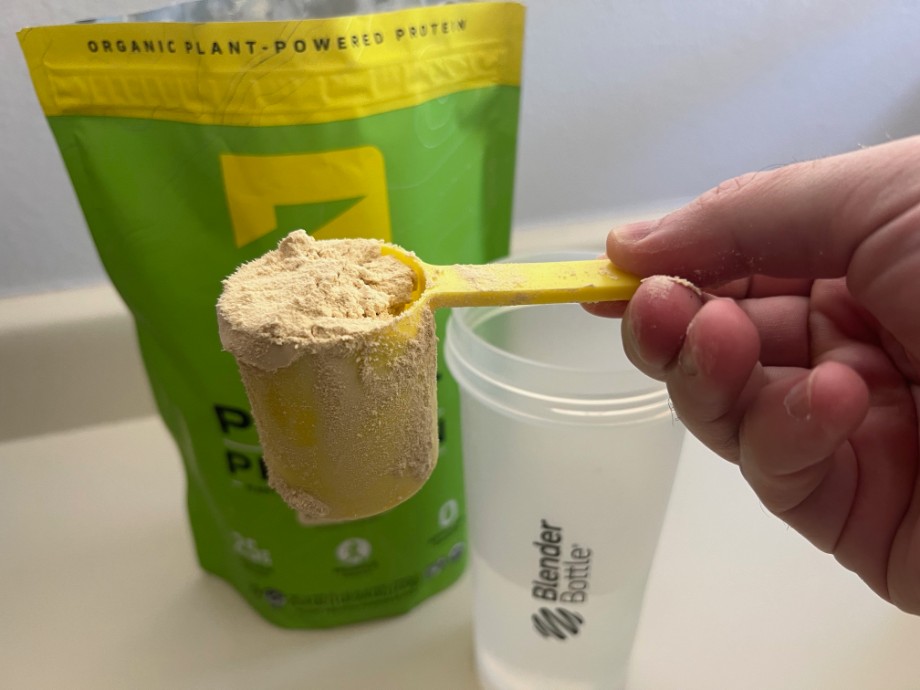We test and review fitness products based on an independent, multi-point methodology. If you use our links to purchase something, we may earn a commission. Read our disclosures.
With so much conflicting information being shared online, the plant-based protein powder benefits are frequently misunderstood. When deciding on a plant protein to add to your supplement stack, choosing the right one for your health, fitness, or wellness goals can be downright confusing.
So, how can you choose the best plant-based protein source for your post-workout shakes? With guidance from trusted nutrition and fitness experts, of course. GGR staff writer Matt Dustin, CES, PN1-NC, and I—a registered dietitian—have teamed up to see whether this plant-based protein lives up to the hype and whether or not it will help you get the results you want.
Read on for our full, in-depth Ascent Plant Protein review!
Medical disclaimer: This article is intended for educational and informational purposes only. It is not intended as a substitute for medical advice. For health advice, contact a licensed healthcare provider. GGR also recommends choosing a product that has been third-party tested for quality.
We Give You the Protein Facts
The GGR expert team has tirelessly tested dozens of the best protein powders so that you can easily find the best options for your health and fitness goals.
Our testers include registered dietitians, Precision Nutrition-certified nutrition coaches, strength and conditioning coaches, Olympic athletes, certified personal trainers, and more, all of whom are obsessed with finding the highest-quality supplements available.
We evaluate all protein powders according to our rigorous GGR supplement testing methodology, which includes:
- Price per serving
- Taste
- Solubility
- Formulation
- Third-party testing
- Customer reviews
We rate each product on a scale of 1 to 5. Unlike other reviews, we share detailed information on how we arrived at each score. We also sample each protein powder as part of our regular fitness and supplementation routines.
RELATED: Best Time to Drink a Protein Shake
Ascent Plant Protein
Ascent Plant Protein
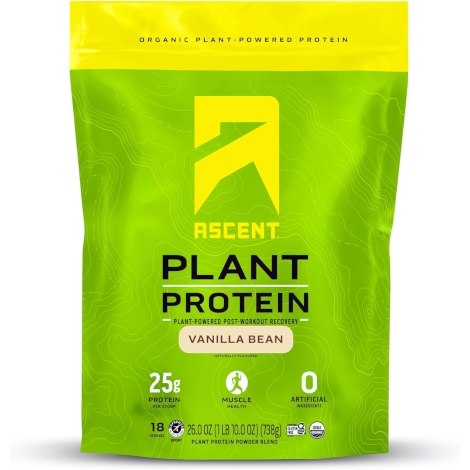
Product Highlights
- Plant-based protein supplement
- Vegan, organic, and gluten-free
- Family-owned company
Pros & Cons
Pros
- 25 grams of protein per serving and 4 grams of BCAAS
- Third-party tested and Informed Sport certified
- No added sugar
- Subscribe and save 10%
Cons
- Only two flavors available
- Reviews note it is hard to mix
- Large serving size compared to competitors at 41 grams
Bottom Line
Ascent Plant Protein powder contains 25 grams protein and 4 grams of BCAAS. Every batch of this protein is third-party tested and Informed Sport-certified. Customer reviews were overall positive but found the protein difficult to mix. Ascent notes their protein is thicker than their competitors and recommends mixing with 12-14 ounces of liquid.
A Quick Look at Ascent Plant Protein
Ascent Plant Protein contains a high-quality, organic plant protein blend featuring real food sources and a clean ingredient list free from artificial sweeteners, flavors, and colors.
According to the brand, Ascent’s plant protein powder was formulated with the input of PhD-level advisors to create a product that effectively improves athletic performance and supports post-workout recovery.
Before You Buy
- USDA-organic, certified gluten-free, and soy-free with zero artificial ingredients
- 25 grams of complete plant protein per scoop
- Ascent plants a tree for every order
RELATED: Best Vegan Protein Powder
Is Ascent Plant Protein Worth It?
If you can find room in your budget—over $2 per serving is a bit pricey—this plant protein is likely to become a staple in your supplement pantry. Its high-quality protein content (and 25 grams of protein per serving) is excellent, making it a great choice for anyone looking to build muscle, gain strength, lose fat, or balance their macronutrient intake.
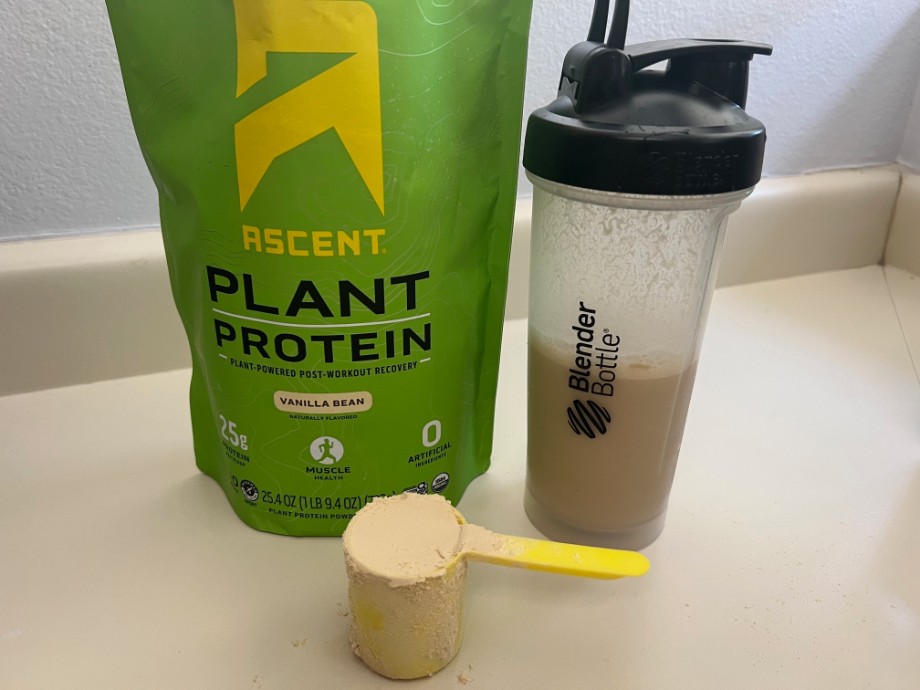
This product doesn’t intentionally contain any major allergens. However, Ascent notes a risk of cross-contamination with tree nuts and peanuts in the manufacturing facility, so it isn’t strictly considered allergen-free.
Great for:
- Anyone wanting a high-quality, organic protein without artificial ingredients or added sugars
- Boosting protein and iron intake on a plant-based diet
- Stimulating muscle growth in combination with resistance training
Not recommended for:
- Those unable to tolerate stevia extract
- People needing a budget-friendly option
- Severe peanut and tree nut allergies (due to the potential risk for cross-contamination)
Ascent Plant Protein Specs
| Price per serving | $2.10 |
| Serving size | 1 scoop (36-41g) |
| Type of protein | Organic pea protein, organic sunflower protein, organic pumpkin protein |
| Protein content | 25g |
| Carb content | 4-8g (depending on flavor) |
| Fat content | 3-3.5g |
| Notable ingredients | Organic cocoa, Organic guar gum, Organic stevia leaf extract, natural flavors, sea salt |
| Flavors | Chocolate, Vanilla Bean |
| Third-party tested? | Yes |
Experience Using Ascent Plant Protein
To get a better feel for how Ascent Plant-Based Protein stacks up in real life, we turned to GGR expert tester and staff writer Matt Dustin, CES, PN1-NC. As a Precision Nutrition Level 1 Nutrition Coach, Matt has tried more than his fair share of protein powders and used this experience to compare the Ascent product to other products.
Overall, Matt was surprised by how much he liked this protein. As someone who doesn’t particularly like vanilla, he actually enjoyed the Vanilla Bean flavor despite finding the texture less smooth than that of whey protein.
RELATED: Plant-Based Protein Powder Vs Whey
Price Per Serving
As alluded to earlier, this is a more expensive protein than other plant-based options. At $41.99 for 20 scoops, it’ll set you back about $2.10 per serving.
While not the most expensive protein powder we’ve seen, the cost can add up, especially if you plan to use multiple daily servings. Because of this, we rated the price a 2 out of 5.
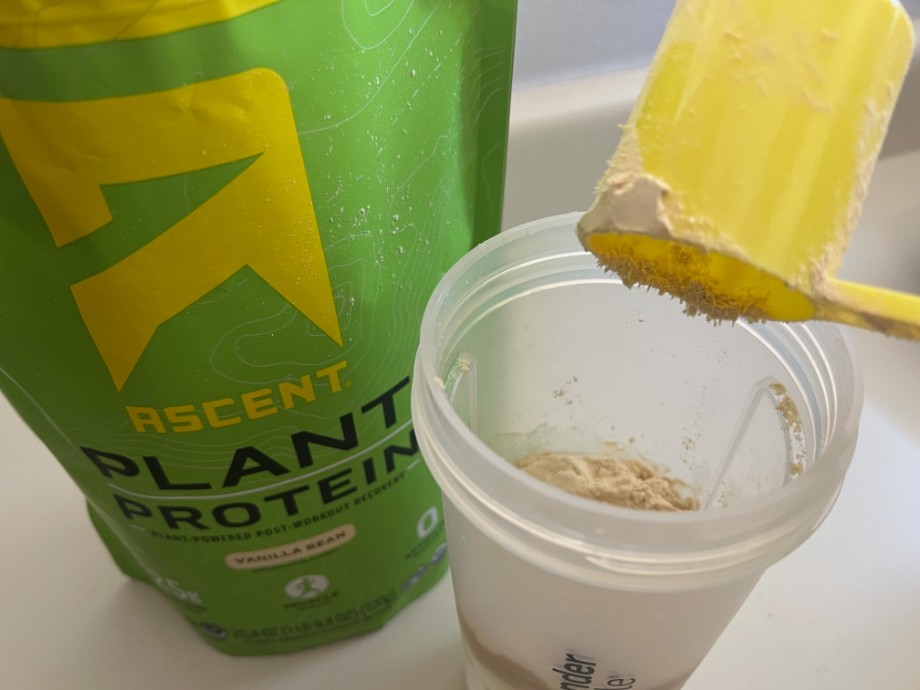
Fortunately, Ascent offers a couple of ways to save a little money. You can “Subscribe & Save” for a 10% discount and free shipping. Or, if you’re making a larger one-time purchase, you’ll qualify for free shipping by spending over $79.
Formulation
The formulation and ingredients used in this protein are outstanding, earning it a 5-out-of-5 rating.
At 25 grams per scoop, it boasts the highest protein content I’ve seen in a plant-based protein powder. Ascent combines pea protein with complementary proteins from sunflower seeds and pumpkin, creating a balanced blend of essential amino acids. This includes 4 grams of branched-chain amino acids (BCAAs) with 2 grams of leucine, a powerful BCAA known for stimulating muscle protein synthesis.
RELATED: What Are BCAAs?
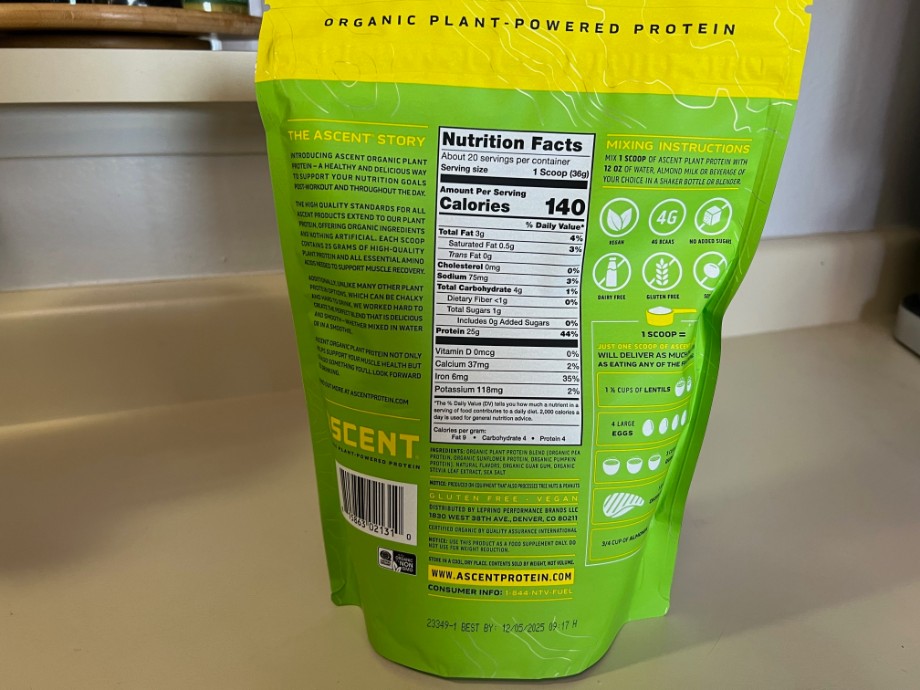
It’s also low in fat and carbs, making it easy to meet your macros. Unlike whey, it’s not a great source of calcium, but it does provide 35% of the daily value for iron, a nutrient that is especially important to prioritize on plant-based diets.
Some people may be anxious when they see guar gum on the ingredient list, but this food additive is safe and unlikely to cause inflammation or gastrointestinal issues. Claims that guar gum consumption is pro-inflammatory are based on conflicting evidence in rodents. However, limited evidence in humans1 has shown the opposite when using hydrolyzed (broken down) guar gum.
Taste and Solubility
Matt tried the Vanilla Bean flavor and was pleasantly surprised at the great taste, giving it a 4 out of 5. He says of the flavor, “[It’s] not too sweet at all. It reminds me more of vanilla bean powder rather than sweet vanilla.”
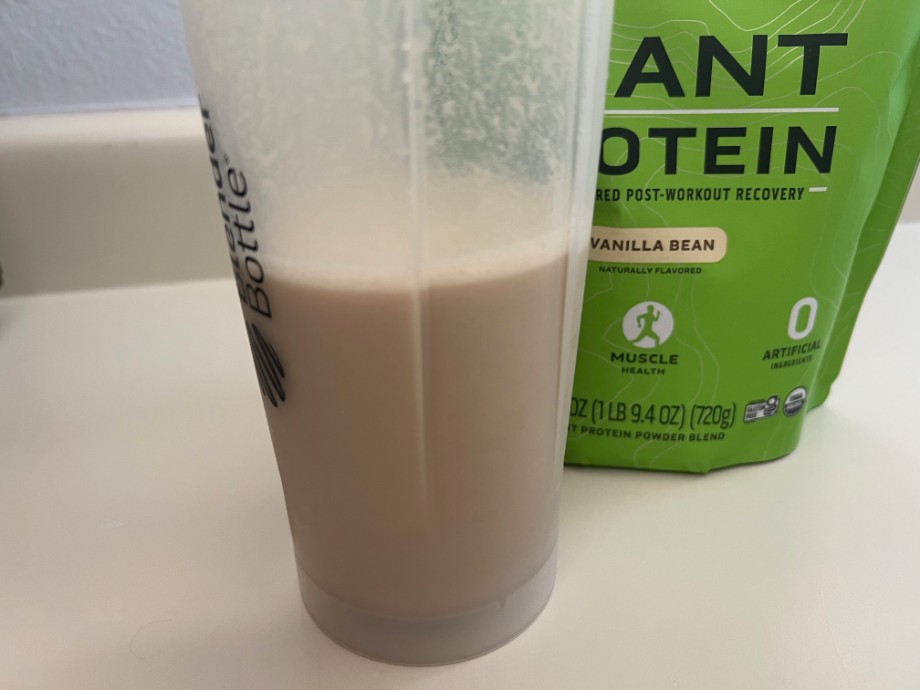
He found the Ascent Plant Protein mixes very well with liquids like water and almond milk, earning it a 4 out of 5 for solubility. The Vanilla Bean was slightly gritty but much smoother than other plant proteins he’s tried.
Side Effects
Many people turn to plant protein powders when they have trouble digesting whey protein, and Ascent Vegan Protein is a good choice. It’s made primarily from pea protein, which is easy for most people to digest.
Happy not to have experienced any gastrointestinal side effects like bloating or discomfort, Matt rated this Ascent a 5 out of 5.
RELATED: Best Protein Powder for Sensitive Stomachs
Third-Party Testing
Ascent Plant Protein is Informed-Sport Certified, meaning it’s been tested for banned substances by an independent lab. This commitment to ingredient quality earns it a 5-out-of-5 rating.
Why is this important? Dietary supplements aren’t well-regulated by the FDA. Unless supplements undergo third-party testing, there’s no way of knowing whether dangerous contaminants are present.
Ascent Plant Protein vs Transparent Labs Vegan Protein
Transparent Labs Vegan Protein
Transparent Labs Organic Vegan Protein Powder
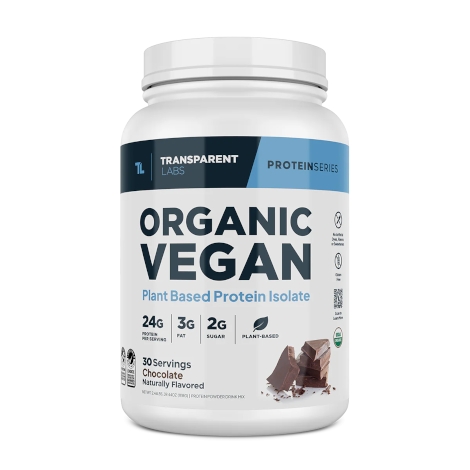
Product Highlights
- A rice and pea protein powder
- Rated with 4.3 stars on their website
- Comes in 2 flavors
- 24 g of protein per serving
- Organic product with minimal ingredients
Pros & Cons
Pros
- No artificial sweeteners, colors, or preservatives
- Organic and vegan
- Only 5-7 ingredients
- Reviewers love the taste
- 24 g of protein per serving
- Subscribe and save
- 30-day money-back guarantee
Cons
- Only 2 flavors
- Stevia can cause GI issues for some
- Expensive
Bottom Line
This organic rice and pea protein powder is a good choice for people who want a clean plant-based protein option with minimal ingredients.
Ascent Plant Protein seems like a solid choice so far, but is it the right choice? To help you make this decision, we’ve compared it directly to another popular plant-based protein: Transparent Labs Vegan Protein.
To learn more, read our in-depth Transparent Labs Vegan Protein review.
| Ascent Plant Protein | Transparent Labs Vegan Protein | |
| Price per serving | $2.10 | $1.67 |
| Serving size | 1 scoop (36-41g) | 1 scoop (36g) |
| Type of protein | Organic pea protein, organic sunflower protein, organic pumpkin protein | Organic rice protein concentrate, Organic pea protein isolate |
| Protein content | 25g | 24g |
| Carb content | 4-8g (depending on flavor) | 3-5g (depending on flavor) |
| Fat content | 3-3.5g | 2.5-3g |
| Third-party tested? | Yes (Informed Sport) | Yes (Informed Sport) |
Customer Experience
Ascent offers 30-day returns on unopened products and 15-day returns on opened products, so you’ll need to quickly return any items that you tried and didn’t like. You have to email Ascent to initiate a return, but the chat and contact form on their website makes this process pretty simple.
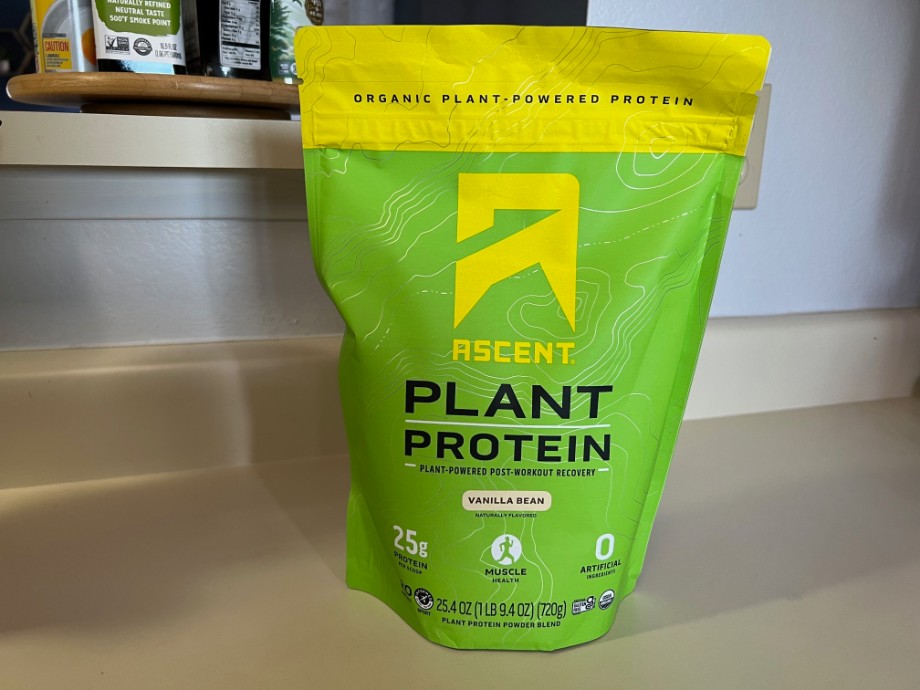
Fortunately, our order was processed without any issues requiring us to contact customer service.
We rated the customer service experience 4 out of 5. It’s pretty flexible but could be more convenient.
Customer Reviews
With an average rating of 4.9 stars on the Ascent website, most customers love the taste and clean ingredients, while some find the stevia extract overpowering. Reviews are a little mixed on the consistency, with some praising its smooth texture and others finding it slightly gritty (Matt would agree) and thick.
Amazon customers aren’t quite as effusive, giving this protein 4 out of 5 stars. Again, most customers love the flavor and protein content, and many praised its easy digestibility. Some thought this protein was too sweet but still repurchased it.
Some Amazon customers felt the consistency was too thick when prepared as directed and felt that the stevia aftertaste was very strong.
Final Verdict of Our Ascent Plant Protein Review
Overall, Ascent Plant Protein is an excellent plant-based product. It provides an impressive 25 grams of high-quality plant protein per serving, which makes it an ideal choice for meeting body composition goals, boosting post-workout muscle recovery, and successfully sticking with a high-protein diet.
Many supplement users will also appreciate its simple, organic ingredients, free from artificial flavors, sweeteners, and colors.
As with any product, however, it might not be best for everyone. You may want to choose from our list of the best pea protein powders if you:
- Are sensitive to the taste of stevia extract
- Don’t like sweeter protein powders
- Have a tree nut or peanut allergy
- Are tired of vanilla or chocolate flavors
- Are on a tight budget
Full Rating
Ascent Plant Protein
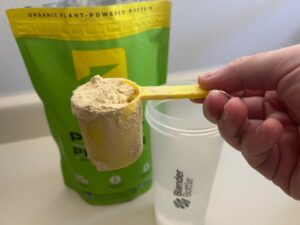
Ascent Plant Protein powder contains 25 grams protein and 4 grams of BCAAS. Every batch of this protein is third-party tested and Informed Sport-certified. Customer reviews were overall positive but found the protein difficult to mix. Ascent notes their protein is thicker than their competitors and recommends mixing with 12-14 ounces of liquid.
Product Brand: Ascent
Product Currency: $
Product Price: 41.99
Product In-Stock: InStock
4.2
Ascent Plant Protein: FAQs
What is the highest quality of plant protein?
Soy protein and plant protein blends—e.g., pea protein with brown rice protein—are considered the highest-quality plant proteins thanks to their optimal amino acid profiles.
Is Ascent protein powder third-party tested?
Yes, Ascent protein powders are Informed-Sport Certified, meaning they’re tested for banned substances.
What are the downsides of plant protein powder?
Some plant protein powders, like hemp protein, are lower in leucine and may not be as effective for stimulating muscle protein synthesis. They also typically have a slightly grittier texture than whey protein powder and may be more expensive.
Is plant-based protein actually healthy?
Plant-based protein is an important part of a healthy diet. Plant protein foods are higher in dietary fiber and antioxidants and lower in saturated fat and cholesterol than animal protein foods. Plant-based protein powders are an effective way to increase your protein intake to support your fitness goals and overall health.
These statements have not been evaluated by the Food and Drug Administration. This product is not intended to diagnose, treat, cure, or prevent any diseases.
References
- Inoue R, Sakaue Y, Kawada Y, et al. Dietary supplementation with partially hydrolyzed guar gum helps improve constipation and gut dysbiosis symptoms and behavioral irritability in children with autism spectrum disorder. J Clin Biochem Nutr. 2019;64(3):217-223. doi:10.3164/jcbn.18-105
Further reading

Our superhero workouts will get you looking and feeling like your favorite heroes from the MCU and beyond! Check them out here! Read more

Looking for a snack that won't derail your fitness goals? Check out our list of the best protein bars for weight loss. Read more

We've had CNCs and registered dietitians test nearly 50 products to bring you the best meal delivery services. Here's all you need to know! Read more

Inflation might work hard but we worked harder to find you the best exercise bikes under $500. Read more

